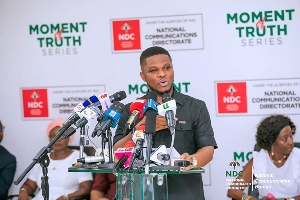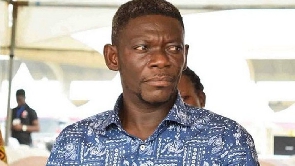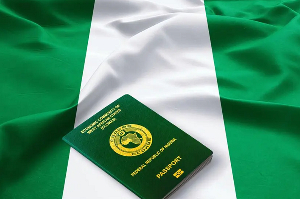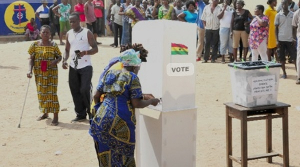- Home - News
- TWI News | TV
- Polls
- Year In Review
- News Archive
- Crime & Punishment
- Politics
- Regional
- Editorial
- Health
- Ghanaians Abroad
- Tabloid
- Africa
- Religion
- Election 2020
- Coronavirus
- News Videos | TV
- Photo Archives
- News Headlines
- Press Release
General News of Monday, 15 February 2010
Source: Gabby Asare Otchere-Darko,
12 Questions from DI to IMF
Mr John Lipsky, First Deputy Managing Director of the International Monetary Fund (IMF), would visit Ghana on February 16-17 as part of a two-nation West African tour that begins in Monrovia, Liberia, on February 14-16.
A press release issued by the IMF External Relations Department, said he would hold discussions with policy makers and key opinion leaders on the countries' economic prospects.
In Accra, Mr Lipsky would meet with political leaders and the economic management team to discuss the country's prospects in the context of the authorities’ current economic programme, which is supported by the Fund under the Extended Credit Facility (ECF). On Feb 17, he would also address Members of Parliament and, later on, participate in a roundtable with civil society organisations.
In both countries, Mr Lipsky would discuss how African countries have been impacted by the global economic crisis, how they have responded to it, and how the IMF can partner with them to support their return to sustainable growth and development.
The Danquah Institute believes this is an opportunity for the IMF to ask itself some serious questions on its prescriptions for Ghana. The Ghana Statistical Service announced recently that it will by mid-year revamp the reporting of Ghana's economic output to include activities currently excluded from official data. They believe Ghana's GDP is much larger than the $16 billion figure. In the words of Ebo Duncan, head of Ghana's Economic Statistics, the revision will "significantly affect the size of some of the numbers such as GDP, budget deficit, public debts." In this case the fundamental question to the IMF is this: have we, since 2009, been prescribing and administering the wrong medicine and dosage to cure the Ghanaian economy based on wrong diagnoses? A bigger GDP would mean our fiscal deficit is not as large as feared and, perhaps, did not require the high dosage of austerity measures prescribed. But, below are 12 other related questions we wish to put to the IMF on that day which are making public now:
1. As a way of enhancing significantly Ghana’s foreign investment status, the country is in the process of becoming an off-shore financial centre. But, the Organisation for Economic Co-operation and Development (OECD) has warned that it will blacklist Ghana once our country becomes a tax haven.
According to Jeffrey Owens, head of the OECD’s Tax Centre: “The last thing Africa needs is a tax haven in the centre of the African continent.†What is the IMF’s stance on this apparent act of double standards and hypocrisy on the part of the OECD?
2. Under the deregulated petroleum pricing regime which was implemented by the Government of Ghana under the previous administration, the pricing for petroleum products was transparent, with the pricing formula available for civil society to see and monitor.
Under the current government, however, the petroleum pricing formula is now hidden and the rationale for any price changes is difficult to decipher. Can the IMF add its voice to ours in requesting that Ghana ’s petroleum pricing formula be published transparently?
3. As a result of the global financial crisis many countries have seen an increase in budget deficits as they have engaged in fiscal stimulus. Botswana for example had a deficit/GDP of 14% in 2009. The United States had a deficit of 13.5%, the UK is similarly at 13% of GDP and Ghana similarly had a deficit of 13.5% of GDP or more, depending on which new components and to which audience our Finance Minister chooses to add.
Were all these foreign governments wrong in trying to protect their economies from the global recession by the adoption of such neo-Keynesian stimulus packages?
4. The IMF tends to consider all deficits as bad. To what extent does the IMF framework account for the growth impacts of investment expenditure in assessing the sustainability of government expenditure policies?
5. Due to the tight fiscal policies pursued by the Ghanaian government and supported by the IMF, the overall effect has been a suppression of domestic economic activity, with both consumption and production suffering. Imports, including both consumer goods and capital goods, suffered last year, as well. How could such a policy be said to have benefited Ghana and Ghanaians?
6. Year-on-year inflation has been on a constant fall for the past 6 months, registering 14.78% last January. However, related actual supply and demand figures show that businesses are forced to sell at reduced prices to beat expiry dates and overall reductions in consumer activity. What is the use of such relatively impressive rates of inflation when it is caused by lack of progressive economic activity?
7. Inflation is as good or bad as the effect it has on the purchasing power of people. With increases in wages and salaries, especially within the public sector, falling below movements in inflation for the first time since 2003, do we have any good reasons to hail the current lower trends in inflation?
8. Although, Treasury Bill yields have been higher in the past 12 months, statistics show that demand for such high-yielding instruments have been low, alongside demand for consumer goods. With both spending and savings performing poorly, are these signs of a bettering economy?
9. The World Bank estimates that due to the harsh economic policy prescription for and direction by government, an estimated 500,000 Ghanaians would join the estimated 6 million people already below the poverty line of less than $1.25 per day by the end of 2010. The Danquah Institute estimates that the figure would be at least twice as high. But, what can be said of an economic policy that makes Ghanaians generally poorer and which worst hits the most vulnerable in our society?
10. The global financial crisis has impacted negatively on growth in many African countries. What facilities are available to help mitigate the impact of the global financial crisis on African countries, what are the conditions for access and how will these facilities benefit the man, woman or child on the street?
11. Creating a good investment climate is critical to the private sector playing its proper role in Ghana ’s growth strategy. However a good investment climate depends very much on the respect for contracts and agreements by all parties.
What is the IMF’s view of governments which upon coming to office tend to abrogate agreements (even those that have been ratified by Parliament) and how does this reconcile with the IMF programme of enhancing the investment attractiveness of Ghana?
12. Good Governance is critical in the development process. This means that the fight against corruption should be pursued comprehensively and not selectively.
Yet, there is a strong perception of selective justice, while very little has been done to strengthen the institutions mandated to fight against corruption. What is the IMF’s view on this?The author is the Executive Director, Danquah Institute gabby@danquahinstitute.org










